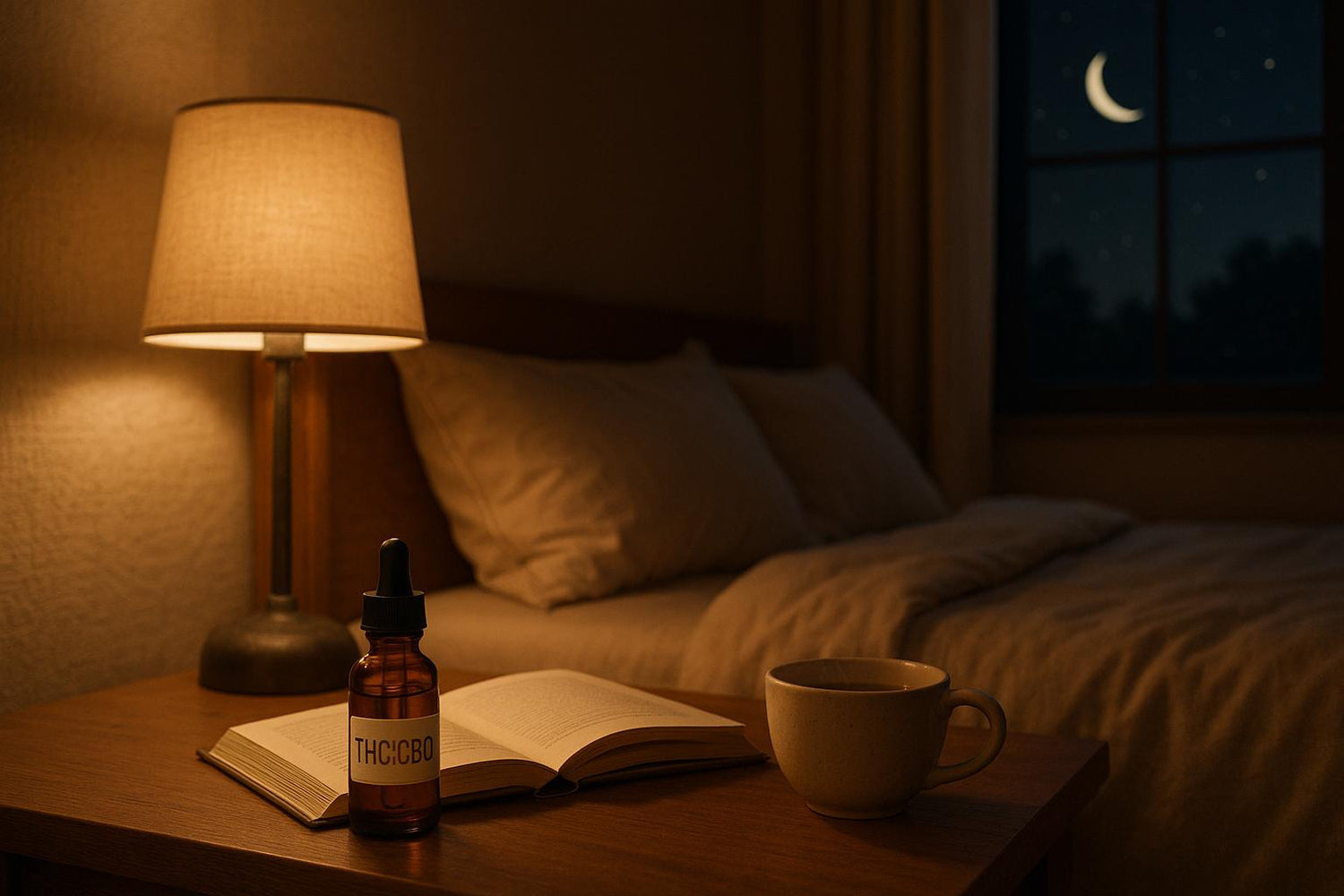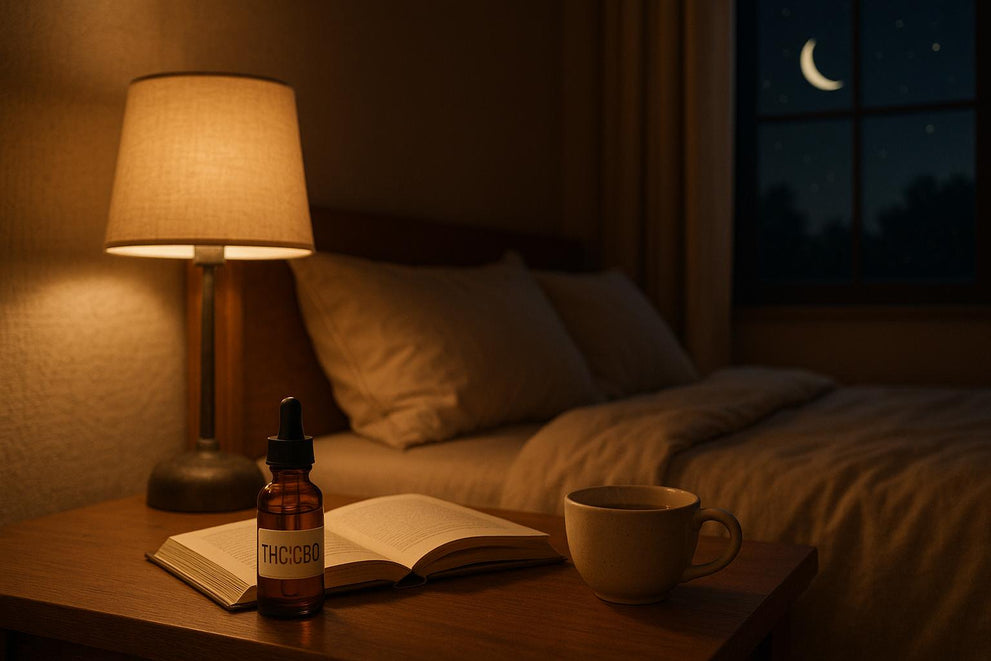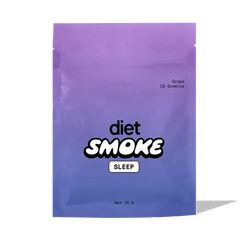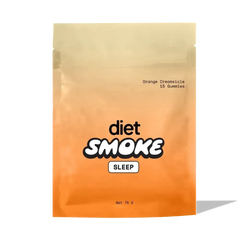Want better sleep with cannabis? The THC:CBD ratio in your product matters more than you think. Here’s what you need to know:
- THC can help you fall asleep faster and deepen sleep at low doses, but higher doses may disrupt REM sleep.
- CBD balances THC’s effects. Smaller amounts keep you alert, while higher doses promote sleep without affecting REM.
- Balanced THC:CBD ratios improve sleep quality by enhancing deep sleep and minimizing REM suppression.
- Dosage and timing are critical. Start low (1–2 mg THC), adjust gradually, and take edibles 1–2 hours before bed for sustained effects.
- Tolerance matters. Regular THC use can reduce its effectiveness over time. Taking breaks or using higher CBD ratios can help.
Quick Tip: Products with balanced ratios (like 1:1 THC:CBD) are great for most users, while high-THC options may suit those with severe insomnia or PTSD. Always consult a healthcare provider before starting.
For more, read on to explore how THC ratios, doses, and methods impact your sleep cycles.
EPISODE #175: How Important are THC:CBD Ratios? with Guillermo Moreno-Sanz, PhD, Khiron Life

How THC Affects the Body's Sleep Systems
When THC enters your bloodstream, it sets off a chain of events that can influence your sleep patterns. THC interacts with the endocannabinoid system, a network of receptors and signaling molecules that plays a role in managing various bodily functions, including sleep. Once THC is in your system, it binds to specific receptors in your brain, affecting how quickly you fall asleep, how long you stay asleep, and the transitions between different sleep stages.
CB1 Receptors and Sleep Regulation
The sleep-related effects of THC are largely tied to its interaction with CB1 receptors, which are located in parts of the brain responsible for sleep regulation. THC acts as a partial agonist at these receptors, meaning it activates them but not to their full capacity. This activation changes the release of certain neurotransmitters, dampening the signals from chemicals that typically keep you awake.
Studies have shown that activating CB1 receptors can enhance slow-wave sleep (deep sleep) by stabilizing and extending the duration of sleep periods. Research by Pava et al. found that direct activation of CB1 receptors increased slow-wave sleep, while blocking these receptors with the antagonist AM281 led to fragmented sleep patterns. Additionally, CB1 activation tends to suppress REM sleep, which might explain why some people experience vivid dreams when they stop using cannabis after regular consumption.
The effects of THC on these receptors are further influenced by the dosage, which plays a crucial role in determining how THC impacts sleep.
THC Dose Effects on Sleep
The amount of THC consumed can significantly shape its effects on sleep. At lower doses, THC often promotes relaxation and helps with falling asleep. This happens because THC increases levels of adenosine, a chemical that builds up during the day to signal the body that it’s time to rest, while also suppressing the brain's arousal systems.
However, moderate to higher doses of THC can sometimes have the opposite effect, especially for individuals who are new to cannabis. For instance, while 15 mg of THC is generally sedating for many users, individual reactions can vary. THC's biphasic nature - where low doses calm and higher doses stimulate - means finding the right amount often requires some trial and error. Too little THC might not provide noticeable sleep benefits, while too much can disrupt natural sleep cycles and lead to grogginess the next day.
Over time, chronic THC use can lead to tolerance, requiring higher doses to achieve the same effects. This tolerance can negatively impact sleep, reducing total sleep time, diminishing deep sleep, and causing more frequent awakenings during the night.
The ratio of THC to other cannabinoids, like CBD, also plays a role in how THC affects sleep. CBD may help balance THC's effects, potentially reducing its stimulating properties at higher doses while maintaining its ability to support sleep. This highlights the importance of considering the cannabinoid profile when using cannabis for sleep.
How THC Ratios Change Sleep Stages
The way THC affects sleep goes beyond its general sedative properties - it also depends on how it interacts with CBD. The ratio of THC to CBD in cannabis products plays a key role in shaping how your sleep stages unfold. These cannabinoid combinations can either support or disrupt your natural cycles of light sleep, deep sleep, and REM sleep. Knowing how these ratios work can help you choose products that align with your sleep needs.
THC:CBD Ratios and REM Sleep Reduction
Higher levels of THC are known to reduce REM sleep, the stage where vivid dreams occur and memory consolidation happens. Research consistently shows that cannabis strains with higher THC concentrations shorten the time spent in REM sleep. As THC dominance increases, this effect becomes more pronounced.
For individuals dealing with PTSD-related nightmares, this reduction in REM sleep can actually be a relief. Studies have found that synthetic cannabis products can significantly reduce or even eliminate nightmares in people with PTSD.
But there’s a catch. While less REM sleep might help with nightmares, it could also have downsides. REM sleep is vital for cognitive health and immune function, so long-term use of THC-heavy cannabis could potentially harm sleep quality. Over time, reduced REM sleep might impact memory, emotional balance, and overall mental performance.
CBD, however, can help balance things out. At higher doses, CBD’s alerting properties may counteract some of THC’s sedative effects. This means products with more balanced THC:CBD ratios may reduce REM sleep less dramatically compared to THC-dominant options.
Improving Deep Sleep with Balanced Ratios
While THC tends to suppress REM sleep, it has the opposite effect on deep sleep, also known as slow-wave sleep (SWS). This stage is essential for physical recovery and immune system health. THC has been shown to boost deep sleep in the short term, providing more restorative rest, particularly in the early part of the night.
Products with balanced THC:CBD ratios can enhance sleep quality more sustainably, promoting the benefits of deep sleep while minimizing the excessive suppression of REM sleep.
However, timing and duration of use are critical. While THC might initially increase deep sleep, long-term use can lead to a decline in SWS. This suggests that relying on high-THC products over an extended period could eventually diminish the sleep benefits you experienced at first.
Since everyone responds differently, finding the right strain and ratio often requires some trial and error. Starting with lower THC levels and gradually adjusting can help you find the ideal balance for better sleep.
For those seeking reliable sleep support, products like Diet Smoke offer lab-tested formulations with consistent THC and CBD ratios. These undergo rigorous testing to ensure predictable results, helping users achieve their sleep goals.
Always consult a qualified physician when using medical cannabis. They can guide you on the best THC:CBD ratio, dosage, timing, and method of consumption to match your unique needs. This personalized approach minimizes unwanted effects while maximizing the benefits for your sleep.
Delivery Methods and Sleep Results
The way THC is consumed can significantly impact how quickly it takes effect and how long those effects last. This is especially important for those seeking either quick sleep onset or sustained relief throughout the night.
Inhalation vs. Edibles: Speed and Duration
When it comes to speed, vaping and smoking are the fastest methods. THC inhaled through these methods enters the bloodstream directly via the lungs, producing relaxing effects within minutes. However, the downside is that these effects typically wear off after about 2–3 hours. This shorter duration might not be enough to keep you asleep through the night.
Edibles, on the other hand, take longer to kick in because they must be digested and metabolized by the liver before THC enters the bloodstream. This digestion process means the effects can take anywhere from 30 minutes to 2 hours to begin. Once active, though, edibles provide relief for 6–8 hours, which is closer to the length of a full sleep cycle. This makes them a good option for individuals who struggle with sleep maintenance insomnia, where frequent awakenings disrupt rest.
| Method | Onset Time | Duration | Best For |
|---|---|---|---|
| Vaping/Smoking | Minutes | 2–3 hours | Quick sleep onset |
| Edibles | 30 minutes–2 hours | 6–8 hours | All-night sleep support |
Another factor to consider is bioavailability - how much THC actually enters your system. Inhalation methods can deliver up to 56% bioavailability, while edibles typically range between 4–20%. This means you may need a higher dose of edibles to achieve the same effects as inhalation, but the trade-off is a longer-lasting impact.
Vaping also offers precise control over dosage and delivers immediate results. For example, Diet Smoke's Blue Dream Disposable Vape provides consistent THC delivery with lab-tested potency, making it a reliable option for those needing quick relief to fall asleep.
Extended-Release THC Products for Sleep
For long-lasting effects, extended-release THC products are another option to consider. To maximize their benefits, plan to take edibles 1–2 hours before bedtime so their effects align with your sleep cycle.
Diet Smoke's Grape Sleep Gummies are designed specifically for sleep support. These lab-tested gummies deliver a mild THC dose in an edible format, promoting restful sleep while helping to establish a consistent bedtime routine.
Some people may find it helpful to combine methods. For instance, using a small amount of inhaled THC for fast sleep onset, followed by a low-dose edible for sustained overnight effects, can be an effective strategy. The key is to experiment gradually and avoid overconsumption to find the balance that works best for you.
sbb-itb-0d19bd1
Safe and Effective THC Use for Sleep
The way THC affects sleep largely depends on finding the right dosage and timing.
Preventing Overuse and Managing Tolerance
Studies show that smaller doses of THC can help with relaxation, while higher amounts might have the opposite effect, causing stimulation or even anxiety. For instance, research published in The Journal of Clinical Psychopharmacology highlights that low doses can deepen sleep cycles, whereas larger doses may disrupt REM sleep and lead to restlessness.
If you're new to THC, starting with 1–2 mg is a good idea to gauge your body's reaction. For most people, 2.5 mg is effective, but doses exceeding 10 mg might interfere with restful sleep. To get the best results, take THC 30–60 minutes before bedtime, allowing time for its effects to set in. If the initial dose doesn’t work, increase it by 50% the next night.
Regular use of THC can lead to tolerance, as it reduces the density of CB1 receptors in the brain. Ryan Vandrey, PhD, explains:
"What commonly happens is people get into a pattern of using cannabis -- whether it's a high THC or high CBD hemp product -- on a daily basis for an extended period of time. Then, when they go one night without it, they can't sleep."
To maintain THC’s effectiveness, taking tolerance breaks (T-breaks) is essential. A break of at least 21 days allows CB1 receptors to recover, with receptor density typically returning to normal after about four weeks. During these breaks, withdrawal symptoms like mood swings, insomnia, and vivid dreams may occur but usually subside within 72 hours.
If taking a full T-break isn’t feasible, consider using products with higher CBD-to-THC ratios. CBD doesn’t build tolerance in the same way THC does and can help balance the effects. Products like Diet Smoke’s lab-tested formulations are designed with balanced ratios to support sleep consistently.
Identifying Side Effects and Adjusting Ratios
Recognizing and addressing side effects is a key part of using THC effectively for sleep. Common issues include morning grogginess, anxiety, paranoia, or even panic attacks. CBD can help counteract THC’s psychoactive effects, often making the experience smoother and more manageable. In fact, combining THC and CBD often results in a more balanced and effective sleep aid compared to using either alone.
Adjusting the ratio of THC to CBD can make a big difference. Here’s a quick guide:
| CBD to THC Ratio | Best For |
|---|---|
| 20:1 | Beginners who want the benefits without feeling high |
| 8:1 | More experienced users avoiding psychoactive effects |
| 4:1 | Those with some tolerance to THC |
| 2:1 | Users comfortable with mild psychoactive effects |
| 1:1 | Seasoned users who can handle moderate THC levels |
If you notice grogginess in the morning, try microdosing THC (1–2.5 mg) or increasing the CBD in your ratio. Keeping a journal to track your experiences with different doses and ratios can help you fine-tune what works best for improving your sleep and overall well-being.
For those looking for convenience, Diet Smoke’s Grape Sleep Gummies provide a precise THC dose designed for restful sleep. Their lab-tested consistency removes the guesswork in finding your optimal dosage.
It’s worth noting that 67–73% of adults report sleep difficulties when they stop using cannabis, emphasizing the importance of using THC thoughtfully and incorporating regular tolerance breaks.
"My sleep expert colleagues will always say behavioral treatments are superior to pharmacological treatments."
Before using cannabis for sleep, especially if you have health conditions or take other medications, consult a healthcare provider. Start with a low dose, increase slowly, and aim for the smallest amount that delivers results rather than chasing stronger effects.
Selecting THC Products for Sleep
When it comes to improving sleep with THC products, choosing the right one is essential. With about 35% of adults in the U.S. getting less than the recommended 7 hours of sleep per night, the demand for effective sleep solutions is clear. The best THC sleep aids are those that are carefully formulated and undergo strict quality checks to ensure they do what they promise - help you achieve better sleep.
Lab-Tested THC Products for Sleep Support
One of the most important factors when selecting a THC product for sleep is third-party lab testing. These tests verify the product’s purity and potency, ensuring that what’s on the label matches what’s inside. Look for products with up-to-date Certificates of Analysis (COAs) that confirm they’re free from harmful contaminants and deliver consistent results. This not only ensures safety but also helps you avoid substances that might disrupt your sleep or harm your health.
For example, Diet Smoke’s Grape Sleep Gummies set a high standard. These gummies are made with a mild THC formula specifically designed to support sleep. They’re rigorously tested to guarantee consistent quality and purity and are crafted from natural, organic ingredients with precise dosing. When reviewing lab reports, it’s crucial to check for key cannabinoids like THC, CBD, and CBN, as well as sleep-friendly terpenes such as Myrcene, Linalool, and Limonene. These compounds often work together in what’s known as the "entourage effect", enhancing their overall effectiveness when combined.
Once you’ve confirmed a product’s quality, the next step is to find the right THC:CBD ratio tailored to your sleep needs.
Matching THC Ratios to Individual Sleep Needs
Choosing the ideal THC:CBD ratio is highly personal. Factors such as your metabolism, tolerance, and genetic makeup all play a role in determining what works best for you. Here’s a quick guide to help match ratios to specific sleep challenges:
| THC:CBD Ratio | Best For | Expected Effects |
|---|---|---|
| 20:1 CBD to THC | Stress-related sleep issues | Deep relaxation with minimal psychoactive effects |
| 10:1 or 5:1 CBD to THC | Anxiety-induced insomnia | Relaxation with reduced psychoactivity |
| 3:1 or 2:1 CBD to THC | General sleep difficulties | A calming effect with mild sedation |
| 1:1 THC to CBD | Moderate sleep issues | Balanced relaxation and sedation with mild psychoactivity |
| Higher THC ratios (5:1 or more) | Chronic pain or severe insomnia | Strong sleep support, often helpful for pain relief |
CBD-only products are a great choice for those dealing with stress, anxiety, or mild insomnia. They offer relaxation without intoxication or the risk of grogginess the next morning. On the other hand, THC-dominant options are often more effective for severe insomnia, chronic pain, or PTSD-related sleep disturbances. However, higher THC levels can sometimes lead to next-day drowsiness.
Finding your perfect ratio requires patience and experimentation. Start with a low dose and gradually adjust until you find what works for you. Keep track of your experiences - note the time it takes to feel effects, the quality of your sleep, any grogginess the next morning, and any side effects. This tracking will help you fine-tune your approach.
For those new to cannabis or using it for therapeutic reasons, personalized guidance can be especially helpful.
Diet Smoke offers a variety of products to cater to different sleep needs. For instance, their Cherry Lime Gummies are a balanced option for moderate sleep support, while the Cosmic Cherry Gummies provide a lighter THC experience for those who prefer a gentler effect before bed.
Ultimately, personal experimentation is key. What works for someone else may not work for you, so take the time to find the right balance while paying close attention to how your body responds. Patience and careful observation will lead you to the ideal solution for better sleep.
Conclusion: Using THC Ratios for Better Sleep
Understanding how THC ratios influence sleep cycles offers a promising approach to addressing sleep difficulties. Research suggests that adjusting the balance of THC and CBD can impact sleep patterns - THC may reduce REM sleep while promoting deeper sleep in the short term. However, the ideal ratio varies from person to person, making personalization key.
Studies highlight the benefits of using cannabis for sleep. For instance, one study found that 60% of participants were no longer classified as clinical insomniacs after using a medicinal cannabis oil with a 10:15 THC:CBD ratio. While this underscores the potential of well-formulated cannabis products, it also reminds us that individual responses can differ significantly.
"Cannabinoids could have a potential positive role due to their effect on the ECS and the limbic and paralimbic systems which decrease the activity of the amygdala and the hypothalamus yielding decreasing hypervigilance and hyperarousal" – Malvika Kaul, Phyllis C. Zee, Ashima S. Sahni
This insight emphasizes the importance of customized cannabinoid formulations in managing sleep challenges.
The effects of cannabinoids are dose-dependent, meaning it’s crucial to start with a low dose and gradually adjust. THC, for example, may act as a sedative in small amounts but can become stimulating at moderate doses. Similarly, CBD may enhance alertness at lower doses but turn sedative as the dose increases. Patience and careful experimentation are essential.
When choosing THC products for sleep, quality is non-negotiable. Opting for lab-tested products ensures you're consuming safe and accurately labeled formulations, free from contaminants that could interfere with sleep or health.
For those considering THC for sleep support, Diet Smoke offers products tailored to these needs. Their Grape Sleep Gummies feature a mild THC formula designed specifically for improving sleep, while Cherry Lime Gummies provide a balanced option for those dealing with moderate sleep issues.
It’s also important to keep long-term use in mind. Prolonged or heavy cannabis use can lead to tolerance, potentially diminishing its effectiveness for sleep over time.
Using THC ratios to improve sleep is a personal journey. Start with lab-tested, low-dose products and monitor how your body responds. With patience and the right approach, you can use THC ratios to enhance your sleep quality and overall well-being.
FAQs
What is the best THC:CBD ratio for improving sleep?
Finding the right THC-to-CBD ratio for better sleep is a personal journey that depends on your unique needs and how sensitive you are to THC. A balanced ratio, such as 1:1 or 2:1 (CBD to THC), can be a great starting point. These ratios often help promote relaxation while keeping THC’s psychoactive effects on the milder side. If you’re someone who’s more sensitive to THC or simply prefer to avoid feeling too intoxicated, higher CBD ratios like 5:1 or 10:1 may provide calming effects without the stronger high.
It’s best to begin with a low dose and gradually adjust until you find what works for you. Since everyone’s tolerance and response to cannabinoids can differ, taking the time to experiment can help you discover the ratio that best supports your sleep and overall restfulness.
How can regular use of THC-heavy products impact my sleep over time?
How THC Can Impact Sleep Over Time
Using THC-heavy products regularly can have a noticeable impact on your sleep quality. Studies suggest that high levels of THC may suppress REM sleep - the stage of sleep that's essential for memory retention, learning, and maintaining emotional well-being. When REM sleep is consistently disrupted, it can lead to difficulties with cognitive function and emotional regulation over time.
Another concern is how prolonged THC use can alter your natural sleep cycles. For instance, some individuals experience withdrawal effects like REM rebound - a sudden increase in REM sleep - which can make sleep feel less restorative. While THC might initially seem like a quick fix to help you fall asleep, relying on it over the long term could have unintended consequences for your overall sleep health.
How do edibles and vaping compare when using THC for better sleep?
The way you use THC - whether through edibles or vaping - can greatly influence how it helps with sleep.
Edibles take longer to show effects, usually between 30 minutes and 2 hours, because they need to pass through your digestive system first. But once they kick in, the effects stick around for a longer period, typically lasting 4 to 8 hours. This makes edibles a solid choice if you're looking for consistent sleep support throughout the night. Just be cautious with the dosage - since the effects are delayed, it's easy to take too much if you're not patient.
Vaping, on the other hand, works much faster. You’ll usually feel the effects within minutes, making it a great option if you need immediate help falling asleep. The downside? The effects don’t last as long, generally tapering off after 1 to 3 hours. This shorter duration might mean you'll need to take another dose during the night.
The best choice really depends on what matters most to you - whether you need quick relief to fall asleep or longer-lasting effects to stay asleep.





